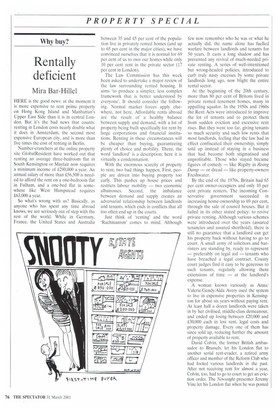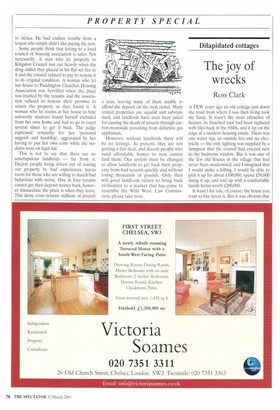Rentally deficient
Mira Bar-Hiliel
HERE is the good news: at the moment it is more expensive to rent prime property on Hong Kong Island and Manhattan's Upper East Side than it is in central London. But it's the bad news that counts: renting in London costs nearly double what it does in Amsterdam, the second most expensive European city, and is more than five times the cost of renting in Berlin.
Number-crunchers at the online property site GlobalResident have worked out that renting an average three-bedroom flat in South Kensington or Mayfair now requires a minimum income of £290,000 a year. An annual salary of more than £56,500 is needed to afford the rent on a one-bedroom flat in Fulham, and a one-bed flat in somewhere like West Hampstead requires £63,000 a year.
So what's wrong with us? Basically, as anyone who has spent any time abroad knows, we are seriously out of step with the rest of the world. While in Germany, France, the United States and Australia between 35 and 45 per cent of the population live in privately rented homes (and up to 65 per cent in the major cities), we have convinced ourselves that it is normal for 69 per cent of us to own our homes while only 10 per cent rent in the private sector (17 per cent in London).
The Law Commission has this week been asked to undertake a major review of the law surrounding rented housing. It aims 'to produce a simpler, less complex framework that is better understood by everyone'. It should consider the following. Normal market forces apply elsewhere, not here. Affordable rents abroad are the result of a healthy balance between supply and demand, with a lot of property being built specifically for rent by large corporations and financial institutions. Renting in these circumstances will be cheaper than buying, guaranteeing plenty of choice and mobility. There, the word 'landlord' is a description; here it is virtually a condemnation.
With the enormous scarcity of property to rent, two bad things happen. First, people are driven into buying property too early. This pushes up house prices and restricts labour mobility — two economic albatrosses. Second, the imbalance between demand and supply creates an adversarial relationship between landlords and tenants, which ends in conflicts that all too often end up in the courts.
Just think of 'renting' and the word `Rachmanism' comes to mind. Although few now remember who he was or what he actually did, the name alone has fuelled warfare between landlords and tenants for 50 years. It casts a long shadow and has prevented any revival of much-needed private renting. A series of well-intentioned but wrong-headed policies, introduced to curb truly nasty excesses by some private landlords long ago, now blight the entire rental sector.
At the beginning of the 20th century, more than 80 per cent of Britons lived in private rented tenement homes, many in appalling squalor. In the 1950s and 1960s the Rent Acts were introduced to improve the lot of tenants and to protect them from sudden eviction and excessive rent rises. But they went too far, giving tenants so much security and such low rents that most landlords, feeling that the law had in effect confiscated their ownership, simply sold up instead of staying in a business that had become both stigmatised and unprofitable. Those who stayed became figures of comedy — like Rigsby in Rising Damp — or dread — like property-owners Freshwater.
By the end of the 1970s, Britain had 65 per cent owner-occupiers and only 10 per cent private renters. The incoming Conservative government succeeded in increasing home-ownership to 69 per cent, through the sale of council houses. But it failed in its other stated policy: to revive private renting. Although various schemes were introduced over the years (assured tenancies and assured shorthold), there is still no guarantee that a landlord can get his property back without having to go to court. A small army of solicitors and barristers are standing by, ready to represent — preferably on legal aid — tenants who have breached a legal contract. County court judges find it easy to be generous to such tenants, regularly allowing them extensions of time — at the landlord's expense. .
A woman known variously as Anna/ Valerie/Gendy/Alda Avery used the system to live in expensive properties in Kensington for about six years without paying rent. At least half a dozen landlords were taken in by her civilised, middle-class demeanour, and ended up losing between £20,000 and £30,000 each in lost rent, legal costs and property damage. Every one of them has since sold up, reducing further the amount of property available to rent.
David Colvin, the former British ambassador to Brussels, let his London flat to another serial rent-evader, a retired army officer and member of the Reform Club who had fooled various landlords in the past. After not receiving rent for almost a year, Colvin, too, had to go to court to get an eviction order. The Newsnight presenter Jeremy Vine let his London flat when he was posted
to Africa. He had endless trouble from a tenant who simply didn't like paying the rent.
Some people think that letting to a local council or housing association is safer. Not necessarily. A man who let property to Kingston Council lost out heavily when the drug addict they placed in his flat set fire to it and the council refused to pay to restore it to its original condition. A woman who let her house to Paddington Churches Housing Association was horrified when the place was trashed by the tenants and the association refused to honour their promise to return the property as they found it. A woman who let rooms in her house to four university students found herself excluded from her own home and had to go to court several times to get it back. The judge expressed sympathy for her 'personal anguish and hardship', aggravated by her having to pay her own costs while the students were on legal aid.
This is not to say that there are no unscrupulous landlords — far from it. Decent people being driven out of renting out property by bad experiences leaves room for those who are willing to match bad behaviour with worse. One in four tenants cannot get their deposit money back, however immaculate the place is when they leave. This alone costs tenants millions of pounds a year, leaving many of them unable to afford the deposit on the next rental. Many rented properties are squalid and substandard, and landlords have even been jailed for causing the death of tenants through carbon-monoxide poisoning from defective gas appliances.
However, without landlords there will be no lettings. At present, they are not getting a fair deal, and decent people who need affordable homes to rent cannot find them. Our system must be changed to allow landlords to get back their property from bad tenants quickly and without losing thousands of pounds. Only then will good landlords return to bring back civilisation to a market that has come to resemble the Wild West. Law Commission, please take note.



























































































 Previous page
Previous page